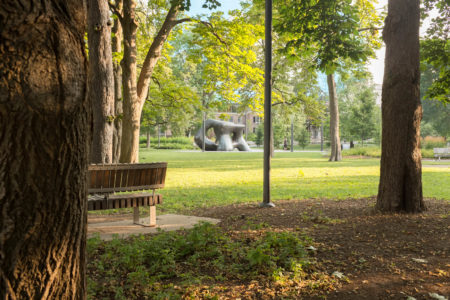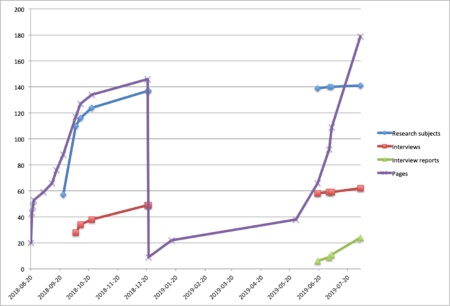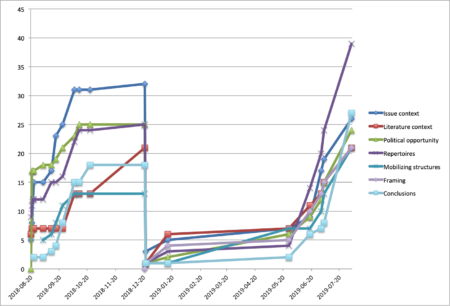Author: Milan
Shapes in the park 2/2
How the oil industry sees the campus fossil fuel divestment movement
Fascinating what you can find online:
Canada’s Oil Sands: Connecting Energy Infrastructure with Core Values
Peter MacConnachie, Suncor Energy
PNWER Meeting, Big Sky
Note especially slide 16 and slide 20: the first is their breakdown of the “enemy naming” strategy which the CFFD movement has adopted to assert the moral complicity of the fossil fuel industry in climate change and other forms of damage, the second focuses on their main lines of counter-argument, that universities should focus on education instead of thinking about the effects of their investment choices, that unlike publicly traded companies state-owned oil firms which hold larger reserves cannot be pressured through divestment, plus a patronizing line about how people worried about climate change just don’t understand how the energy system works.
tap tap tap
A solar sail is functional in space
It’s possible to perform orbital maneuvers which would normally require fuel using instead the momentum of sunlight.
Via the incomparable Scott Manley: Lightsail 2 Sails On Sunlight At Last
Shapes in the park 1/2
Happy birthday
My pipeline for The Economist
Largely at my friend Neal’s recommendation, I began reading The Economist in high school and subscribed around the time of the 2000 U.S. election. I remember the political cartoons of George W. Bush with giant ears and cowboy boots, and how the magazine at that time was still just printed in red and black. I left a trunk full of old issues when I left Vancouver in 2005, but I expect they have been recycled and the trunk repurposed by now. They were hardly in mint condition.
Indeed, for me a central part of reading The Economist is hand annotating it. Each week I have a preliminary read, which if convenient I will do on the day the issue arrives. I read the “leaders” or opening editorials and the letters section, then skim the rest. I usually read a few pieces from the United States section including the Lexington column, anything interesting about Canada in the Americas section, and particularly interesting or pertinent articles from the Middle East and Africa, Europe, Britain, International, and the new China section – usually including the Bagehot column on the UK. I rarely read anything from Business or Finance and economics on the preliminary read unless it is related to climate change or another topic I track closely. I generally read most or all of Science and technology, skim Books and arts for books on topics of interest, and then read the obituary. The Johnson column on language is good, though predictable in its editorial positions.
As I read, I circle or underline especially relevant or interesting passages. If the article is on a topic that I track on this site, I put a star above it and fold down the corner of the page. I also use my standard set of shorthand annotation symbols for things like the main thesis of an argument, questionable claims, details on methodology, and so on.
During the comprehensive read I ideally read every word of everything else, though I admit that there are countries which I find hard to keep track of in detail and topics of little interest to me. I usually have several recent issues where I am working on the comprehensive read at once, though sometimes I will set aside a block of time to finish reading through a bunch to get them out of the way.
The final step is to add references to articles to subject specific databases, including posts on this blog tracking things like antibiotic resistance and geoengineering. I sent articles likely to be of special interest to friends and family members to them at this stage also. It’s quite satisfying to tear up the finished issues and put them into the recycling, reminding myself that material is still moving through the pipeline. There is no reason to keep the paper copies, since all the content is available to subscribers online, but reading and annotating the articles definitely helps me concentrate and lets me focus on the content without the distractions of a computer.
I certainly don’t agree with everything they say, and in particular I think they are incoherent on the subject of climate change. Their articles specifically about the subject stress the need for radical change to avoid catastrophe, but that hasn’t properly carried over into their general coverage of politics and business where they continue to celebrate new fossil fuel discoveries and infrastructure.
Reading The Economist for the better part of 20 years now has certainly been informative and educational. It has exposed me to information about a lot of subjects and topics that never break into headline news in Canadian, US, and UK newspapers. I have written them a few dozen letters over the years but never had one published, though when I was at Oxford I once got a handwritten postcard by mail saying my comments had been passed on to the article’s author.
Cousin with somebody’s child
Pieter Basedow
If you are interacting with Toronto’s Pieter Basedow (date of birth 1958-09-01) it would be a good idea to question what he says about himself. For organizations he lists as past employers and volunteer positions it would be prudent to ask them what experience they actually had with him and what they think of him now.
Related:







